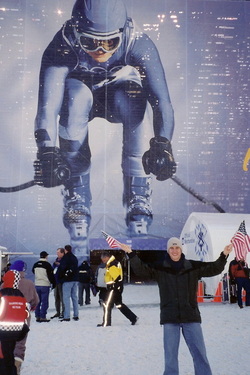
Way over here, in Park City, the forecast high is 57 with partly cloudy skies.
Coincidence? Maybe not, but I chalk it up as another reason why we should all take a deep breath before deciding to host another worldwide winter dance party.
I know I am in the minority here, and a pretty small minority, at that. Especially in the hours after another Winter Olympics has ended, folks around here are riding high in their enthusiasm to bring the Olympics back to Utah. KSL-TV just reported the largest share of viewing audience for the Sochi Games of any NBC affiliate in the nation. Utahns still have the fever.
And I can’t blame you. Even I was up at 4:30 a.m. Sunday to
| | watch the gold medal hockey game with my 11-year-old son, who normally can’t roll out of bed for school at 8 a.m. And the U.S. team wasn’t even playing, for heaven’s sake. But go through it all again? Are you sure? The Olympics can be intoxicating, and in a good way. For the most part, it offers a pure form of athletic competition and international good will. And back in 2002 we nailed it. We nailed it so good I’m not sure we can top what we did. We keep hitting that nail, as a matter of fact. Not many Olympic sites hang onto their venues the way Utah has. From the speed skating oval in Kearns to ski jumping in Park City, Utah’s venues still play host to major competitions. Not only that, they are training centers. U.S. Speedskating makes Utah its headquarters, as does the U.S. Ski and Snowboard Association. Students from Westminster College, which grants full tuition to qualifying winter athletes, made up 10 percent of the U.S. Olympic team this year. This is all great stuff. But it’s also great stuff we’ve already got. Every time Utah was mentioned in Sochi, it brought publicity that couldn’t be bought. Hosting the games again won’t bring this area as much of a lift as 2002 did, because we’re still riding on that lift. All we’ll get are the worries and headaches. Am I the only one who remembers those? Most of what can go wrong at an Olympics is beyond the control of the host city. That list includes international perceptions, protests, political disputes, war, terrorist attacks and, of course, the weather. Sochi’s reputation took a big hit when the sun began to shine. It’s been just as warm here recently. But even if the weather was cold, an inversion that sets off pollution warnings in the valleys actually could scare tourists away. What if the cauldron won’t light? What if no one can see it in the fog? What if the Department of Air Quality tries to extinguish the flame because it’s adding to the pollution? And don’t forget the costs. Even if the venues already are in place, new sports have been added since 2002 and upgrades would be necessary everywhere. Even Sylvester Stallone found that sequels don’t always bring success. I know I won’t win this debate. The state already is preparing for a possible bid for 2026. So how about a compromise? Let’s petition the IOC to make Utah the permanent alternate site for the winter games. If disaster strikes, if war begins, the host city runs out of money or it has a really lame mascot, the games could be switched here on short notice. People are happy to cut some slack to a last-minute understudy. The pressure to be perfect actually would be diminished, even if Park City hit 60 degrees. Slavery update: Since my post last week on slavery in Utah, the Utah House passed HB254, a bill that would protect children from being prosecuted for prostitution if they’re victims of trafficking, 73-0. The bill’s sponsor, Rep. Jennifer Seelig, D-Salt Lake City, and deputy Attorney General Greg Ferbrache told me the bill would protect victims and give them the help they need. That’s a great step, as is a provision that allows victims to sue the bad guys and collect up to three times the cost of damages. Here’s hoping the Senate passes it soon, as well. |

 RSS Feed
RSS Feed

